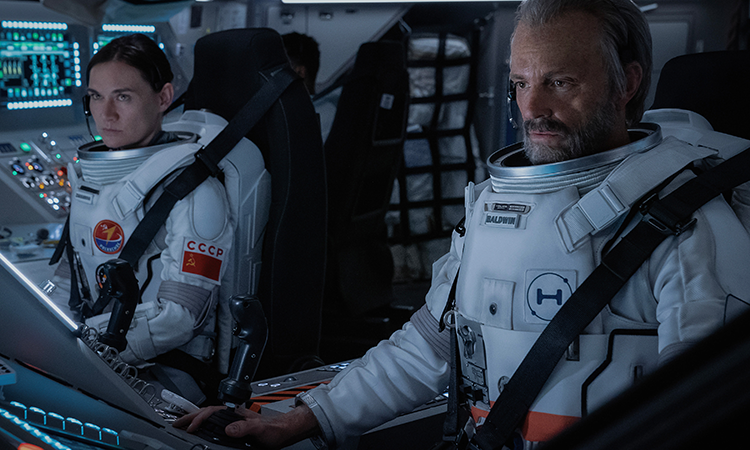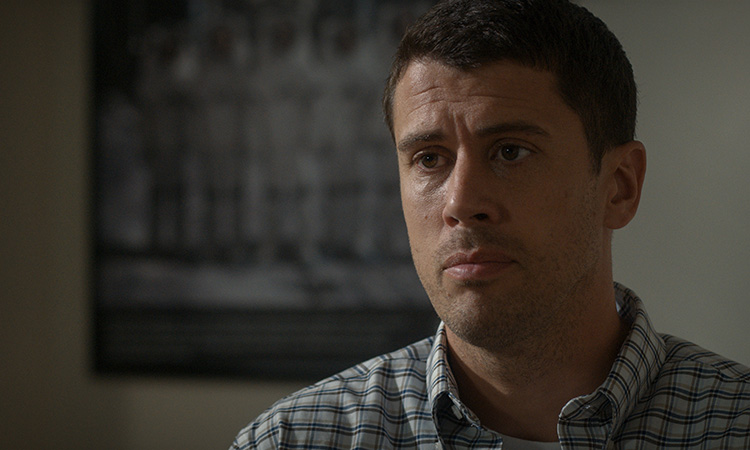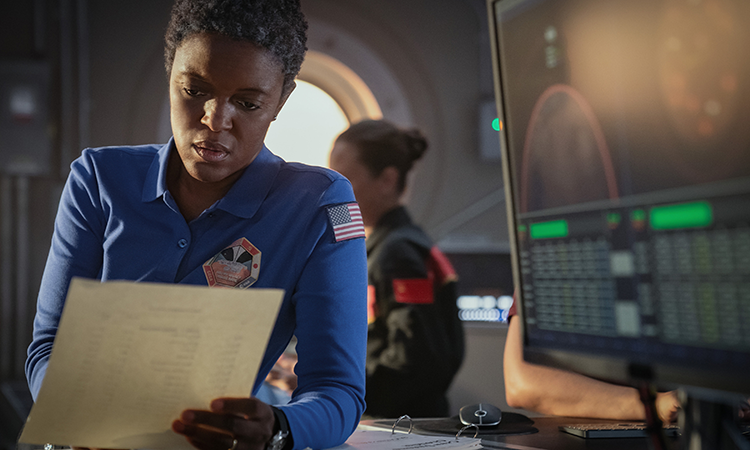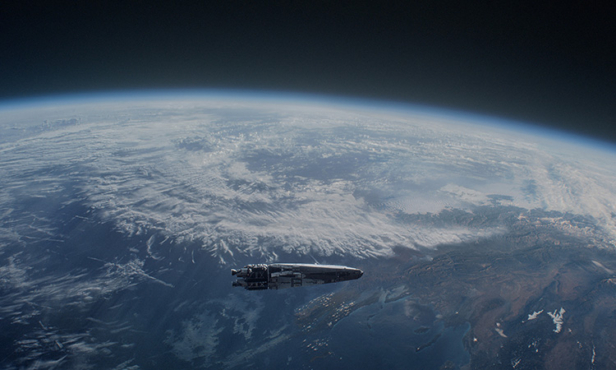“The thing that For All Mankind does so well is, despite the fact that it’s a sci-fi show and we do so much in space, it’s really a character show at the end of the day, and it’s all about their relationships,” says For All Mankind’s executive producer Maril Davis.
Yes, we’re back with Ed Baldwin and Margo Madison and co for the fourth season of the alternative history sci-fi show and guess what – we’re going back to Mars!
The story picks up in 2003, which is about eight years after the end of Season Three. NASA is trying to mine astroids and the Martian base has grown…
“It’s much bigger than where we saw it last year,” explains series creator and executive producer Ronald D. Moore. “Now there’s not just astronauts on the surface of Mars, there are also civilians that are there to do some of the work. We’re starting to see that people are going into space for different reasons. It’s not just the early pioneers. Now we’re starting to settle, we’re starting to see conflicts among them.”
Among the Martian settlers is our favourite grumpy astronaut, Ed Baldwin (Joel Kinnaman), who hasn’t been on Earth in a long time (he’s also taking to growing weed). “He’s been on Mars for the past eight years, he’s never gone home,” explains Davis. “Obviously, this has created some conflict between him and his daughter, who he hasn’t seen. I think Ed is really at a point where he’s struggling to figure out where he is in life. He’s kind of always been about the job, but now he is literally all about the job.”

Behind the Iron Curtain
Meanwhile, back on Earth, the former head of NASA, Margo (Wrenn Schmidt), is adjusting to life in Russia after her betrayal of sharing NASA insights with the Soviet Union, which we saw in Season Three.
“Margo is behind the Iron Curtain as we saw at the end of last season, and we’re going to follow her story [in Season Four], living in the Soviet Union and what life is like for her,” explains Moore.
Indeed, just as Davis says, even though For All Mankind deals with alternative histories and space exploration, it’s the characters that have always been front and centre of the show, and so it’s no surprise that its creators aren’t most excited about space ships and exploring different planets, it’s this story of Margo living in Russia.
“I’m most excited to have audiences see the world of the Soviet Union,” nods series creator and executive producer, Matt Wolpert. “We’re pulling the Iron Curtain back and showing Margo’s journey in that world.
“It’s been something that the show has referenced a lot in the previous seasons and we’ve seen little glimpses and met characters, but it’s always been ‘the enemy over there’, ‘the competition’, and we’ve never really seen what’s going on, on a human, ground level.”
“I really love Margo’s arc this season,” adds Davis. “She’s just in such a different place – Margo is a character that did the wrong things for the right reasons and that’s always such an interesting character dilemma to show with someone. This season will be such an emotional journey for her, I think fans will really enjoy it.”

“Also, seeing Margo, this woman who we’ve seen her journey to become the central figure of NASA and being involved in every decision and at the centre of everything, suddenly being on the outside of things and trying to find her place in a new society, in a new world, and trying to be relevant still, is a really fascinating evolution of that character,” Wolpert says. “So I’m really excited for people to see that.”
Being set over decades, For All Mankind has the unusual position of exploring its characters over the majority of their lives. For creator and executive producer, Ben Nedivi, that element is “the biggest, most exciting factor of writing this show”.
“The ability to tell a person’s lifetime story over decades is very unique on a TV show,” he continues. “That was something that we really grabbed on to early on; we can really hold on to these characters, to see how much they change, how much people can change – and not change – in their lifetimes.”
There are a few downsides to following characters over such a long period of time, Ed and Margo are getting older (expect a few bad backs!) and after the [literally] explosive ending to Season Three, we’ve lost a few characters too.
“We didn’t want to do a show that by season seven has 100-year-old astronauts floating around!” says Nedivi. “So we knew, in order to pull this off, the cast and the cast of characters would have to evolve in a way that feels natural. The difficult thing was these characters and actors that we fell in love with early on, we’ve had to say goodbye to a few. We always do it when we feel that their story arc is complete, that we don’t have more story to tell with them.
“[But] it allows us to also bring in new voices like Dev in Season Three. And now Miles Dale in Season Four are perspectives that we haven’t had on the show yet, that really opened up the world of the show in a way they need to when you get into the fourth, fifth season of a television show.”
Yes, Season Four of For All Mankind will introduce us to Miles Dale (played Toby Kebbell) a blue collar worker who decides to go to Mars to provide for his family. But when he gets there, he realises that class systems are starting to form (his food rations aren’t as good as the astronaut’s food rations for instance) and perhaps the Red Planet isn’t quite the utopian answer he was looking for.

A mission to Mars
For the creators of For All Mankind, exploring Mars was always on the cards, even though the series started with the race to be the first on the moon. “In the beginning of the writers room, we spent a decent amount of time talking about the overall evolution of the series and Mars has just captured human imagination for so long,” remembers Wolpert. “The moon to us felt like the stepping stone to greater things.
“The moon was never really the focus of the show, it was kind of the first stage, which was also how the space programme viewed the moon: ‘Well, let’s dip our toe in the water and see if we can do this. And then on to the next thing”.
“But because the space race ended, we never got to those next stages. So that was really the core of the idea of the show. Okay, we’ve already been to the moon here in our alternate history, how do we go forward? Mars felt like that right first step beyond what we’ve already done.”
Alternative history
Speaking of those alternatives, each season opening of For All Mankind shows alternative moments in history. From global changes like America’s first female president and the creation of an alternative fuel source to oil, coal and gas, to elements like John Lennon not being assassinated – each change has a ripple effect on the world.
“Most of it is based on what we feel would be a butterfly effect from the original breaking point,” Nedivi explains. “The point of departure to the Russians landing on the moon first and the space race continuing. So a lot of the original historical alternatives came from that.
“But of course, as time goes on, and decades pass on, the impact of that would go even beyond the space programme. It would impact other news, it would impact global politics, it would also impact entertainment. So most of it comes from that and then some of it comes just from a sense of fun that we have in terms of imagining a world where John Lennon is still alive. A world where Close Encounters of the Third Kind won the Oscar for Best Picture.
“So yes, some of it is maybe our own wish fulfillment, but a lot of it is also based on research and really thinking through what would be the ramifications of this change.”
Keeping the science real
That research extends to the scientific plausibility of the technology seen in the show – you don’t need to look further than the official podcast for the show, which discusses the series and science with real astronauts.
“We do try to keep the show as realistic as possible,” nods Moore. “We have technical advisors, we reach to outside people, we do a lot of research. We want the show to be believable. This is an alternate world that we want the audience to accept as a real possibility. And also something that we can really achieve, like nuclear fusion, is something that in the show has now become a part of everyday life. It’s changed the world and but nuclear fusion is something that we could really do today. So we really wanted everything in the show to be plausible and believable.”

To make the science believable, the creators take inspiration from real life: “We like to keep one foot in the real world and one foot in our alternate world, so I think they do affect it, but more as touch points for the season we’re in,” explains Nedivi.
“So for instance, in the early 2000s there was a huge burst of commercialisation, and the technology was increasing. So that’s something we wanted to capture in Season Four, as well as the idea of commerce going to Mars and what the impact of that would be. That was one of the instigators of the season’s storyline, the positive and negative impact of that kind of commercial exploration, which also reflects what happened in the early 2000s, as well, with the tech boom, and the tech bust.
“So for us, this dream of harnessing an asteroid and exploiting its resources would be, we felt, undeniable for the world to take advantage of and we wanted to really show the downside of that kind of push.”
Exploring the solar system
So we’ve gone to the moon, we’re colonising Mars, we’re harnessing resources from asteroids. Where do we go from here? Are there any other planets on the horizon in For All Mankind?
“We’re always looking for that next step in the journey,” reveals Wolpert. “There’s a moment in episode one of season one where Gene Kranz is talking about not letting up in the space race, and just because we lost doesn’t mean we should give up because the extension of what they’re doing in trying to get to the moon is that they can go to Mars, to Jupiter, to the moons of Saturn and beyond, into the galaxy.
“So from the beginning of the show, literally the first episode, we’ve intended to show the full extent of what is possible, but it’s also important to us to make sure that it feels real within the world of our show. We don’t want to push so far forward that it doesn’t feel grounded enough, like yes, those people in that world could really have gone to the [moon of Jupiter] or Europa or any of those other tantalising destinations in the solar system.”
“All those things are on the table,” adds Moore. “We definitely want to continue to explore and expand space exploration out into the solar system, and one day beyond. I think you’ll see the show eventually start to do those things…”
For All Mankind Season 4 premieres globally with the first episode on Friday, 10 November 2023, on Apple TV+, followed by new episodes weekly, every Friday exclusively on Apple TV+. Read more exclusive interviews at SciFiNow.



